欧洲难民危机presention
- 格式:ppt
- 大小:8.37 MB
- 文档页数:37
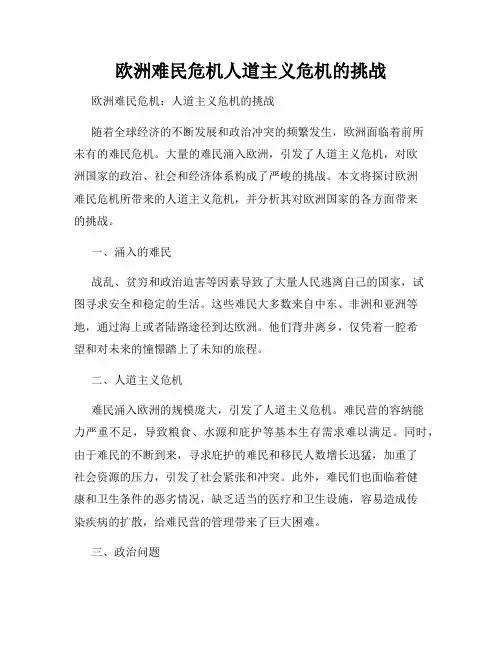
欧洲难民危机人道主义危机的挑战欧洲难民危机:人道主义危机的挑战随着全球经济的不断发展和政治冲突的频繁发生,欧洲面临着前所未有的难民危机。
大量的难民涌入欧洲,引发了人道主义危机,对欧洲国家的政治、社会和经济体系构成了严峻的挑战。
本文将探讨欧洲难民危机所带来的人道主义危机,并分析其对欧洲国家的各方面带来的挑战。
一、涌入的难民战乱、贫穷和政治迫害等因素导致了大量人民逃离自己的国家,试图寻求安全和稳定的生活。
这些难民大多数来自中东、非洲和亚洲等地,通过海上或者陆路途径到达欧洲。
他们背井离乡,仅凭着一腔希望和对未来的憧憬踏上了未知的旅程。
二、人道主义危机难民涌入欧洲的规模庞大,引发了人道主义危机。
难民营的容纳能力严重不足,导致粮食、水源和庇护等基本生存需求难以满足。
同时,由于难民的不断到来,寻求庇护的难民和移民人数增长迅猛,加重了社会资源的压力,引发了社会紧张和冲突。
此外,难民们也面临着健康和卫生条件的恶劣情况,缺乏适当的医疗和卫生设施,容易造成传染疾病的扩散,给难民营的管理带来了巨大困难。
三、政治问题欧洲国家面临难民潮带来的一系列政治问题。
首先,难民危机引发了各个国家和政治派别之间的争议和分歧。
某些国家对难民问题采取开放和友善的姿态,而另一些国家则持保守和关闭的立场。
这使得整个欧洲联盟内部出现了困难和分裂,破坏了欧洲的团结和一体化进程。
其次,由于一些恐怖分子乘难民潮混入,对欧洲国家的安全构成了威胁。
这对于已经面临经济和政治压力的国家来说,更加加重了负担,并导致更多的政治问题。
四、经济挑战难民危机给欧洲国家的经济系统带来了巨大的挑战。
首先,难民潮使得欧洲国家的就业市场面临竞争压力。
大量的难民涌入,增加了就业市场的竞争力,使得本地居民的就业机会减少。
此外,为了满足难民的基本需求,欧洲国家需要投入大量的资源和资金,方便难民的教育、医疗和基础设施建设等。
这对于欧洲本身正面临经济不景气的情况来说,无疑增加了额外的压力。
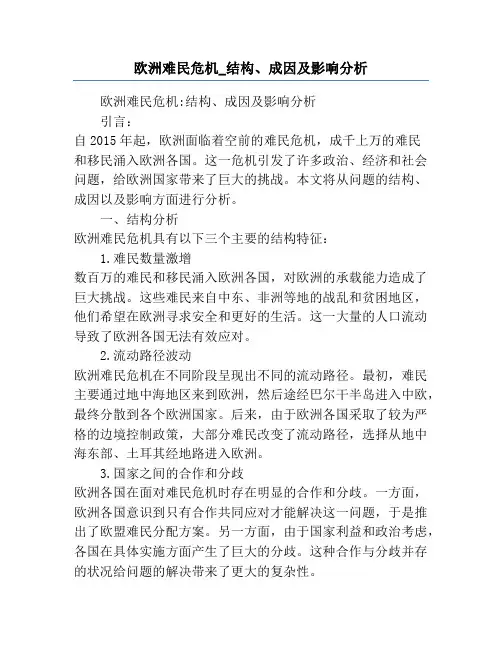
欧洲难民危机_结构、成因及影响分析欧洲难民危机:结构、成因及影响分析引言:自2015年起,欧洲面临着空前的难民危机,成千上万的难民和移民涌入欧洲各国。
这一危机引发了许多政治、经济和社会问题,给欧洲国家带来了巨大的挑战。
本文将从问题的结构、成因以及影响方面进行分析。
一、结构分析欧洲难民危机具有以下三个主要的结构特征:1.难民数量激增数百万的难民和移民涌入欧洲各国,对欧洲的承载能力造成了巨大挑战。
这些难民来自中东、非洲等地的战乱和贫困地区,他们希望在欧洲寻求安全和更好的生活。
这一大量的人口流动导致了欧洲各国无法有效应对。
2.流动路径波动欧洲难民危机在不同阶段呈现出不同的流动路径。
最初,难民主要通过地中海地区来到欧洲,然后途经巴尔干半岛进入中欧,最终分散到各个欧洲国家。
后来,由于欧洲各国采取了较为严格的边境控制政策,大部分难民改变了流动路径,选择从地中海东部、土耳其经地路进入欧洲。
3.国家之间的合作和分歧欧洲各国在面对难民危机时存在明显的合作和分歧。
一方面,欧洲各国意识到只有合作共同应对才能解决这一问题,于是推出了欧盟难民分配方案。
另一方面,由于国家利益和政治考虑,各国在具体实施方面产生了巨大的分歧。
这种合作与分歧并存的状况给问题的解决带来了更大的复杂性。
二、成因分析欧洲难民危机形成的背后存在多方面的原因:1.中东和非洲的冲突和贫困中东地区的战乱、国家崩溃以及非洲地区的贫困和政治动荡,直接导致了大量的人民离开家园。
战争和贫困使他们不得不寻求安全和生计的地方。
2.移民网络和人口信息的传播移民网络的出现使得信息的传播更加容易,并使得更多人选择了移民和难民的方式来进入欧洲。
各种社交媒体和通信技术的普及,使得人们对于移民和难民的情况了解更为广泛。
3.欧洲政策的不一致和阻碍欧洲各国在处理难民问题上的政策不一致和存在的阻碍也是难民危机形成的原因之一。
一方面,部分国家采取较为严格的边境控制政策,不愿承担更多的难民;另一方面,欧盟难民分配方案在实施过程中遭遇了多方面的阻碍。
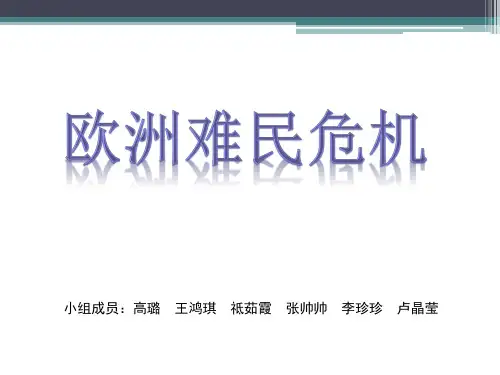
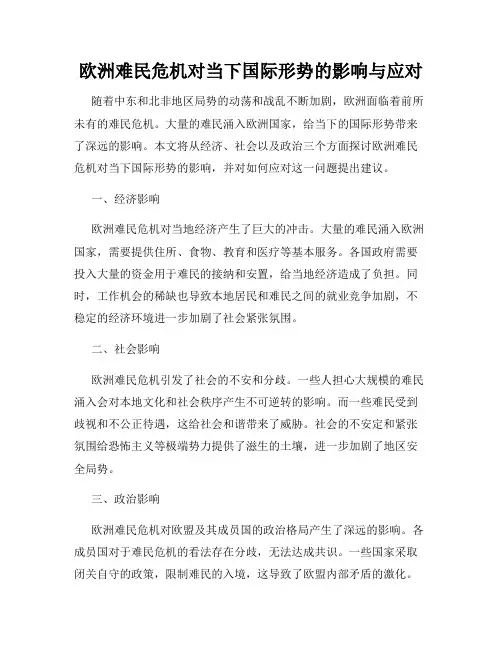
欧洲难民危机对当下国际形势的影响与应对随着中东和北非地区局势的动荡和战乱不断加剧,欧洲面临着前所未有的难民危机。
大量的难民涌入欧洲国家,给当下的国际形势带来了深远的影响。
本文将从经济、社会以及政治三个方面探讨欧洲难民危机对当下国际形势的影响,并对如何应对这一问题提出建议。
一、经济影响欧洲难民危机对当地经济产生了巨大的冲击。
大量的难民涌入欧洲国家,需要提供住所、食物、教育和医疗等基本服务。
各国政府需要投入大量的资金用于难民的接纳和安置,给当地经济造成了负担。
同时,工作机会的稀缺也导致本地居民和难民之间的就业竞争加剧,不稳定的经济环境进一步加剧了社会紧张氛围。
二、社会影响欧洲难民危机引发了社会的不安和分歧。
一些人担心大规模的难民涌入会对本地文化和社会秩序产生不可逆转的影响。
而一些难民受到歧视和不公正待遇,这给社会和谐带来了威胁。
社会的不安定和紧张氛围给恐怖主义等极端势力提供了滋生的土壤,进一步加剧了地区安全局势。
三、政治影响欧洲难民危机对欧盟及其成员国的政治格局产生了深远的影响。
各成员国对于难民危机的看法存在分歧,无法达成共识。
一些国家采取闭关自守的政策,限制难民的入境,这导致了欧盟内部矛盾的激化。
同时,难民危机也被一些极右翼政党利用,加剧了民粹主义的崛起,削弱了欧洲统一的力量,对欧洲一体化进程构成了严重挑战。
针对欧洲难民危机对当下国际形势所带来的影响,应采取以下措施:一、加强国际合作国际社会应加强合作,共同应对难民危机。
各国应就难民的接纳和定居问题进行协商,共同承担难民的分担责任。
同时,国际社会应加大对冲突地区的援助力度,帮助其重建和稳定,减少战乱导致的难民潮。
二、改善经济条件经济是解决难民危机的关键。
国际社会应加大对难民接纳国家的经济援助力度,帮助其满足难民的基本生活需求。
同时,通过对难民进行技能培训和教育,提高其就业能力,减少对当地资源的压力,实现难民与本地居民的共赢。
三、加强社会融合为了缓解社会紧张局势,接纳国家需要加强对难民的社会融合。
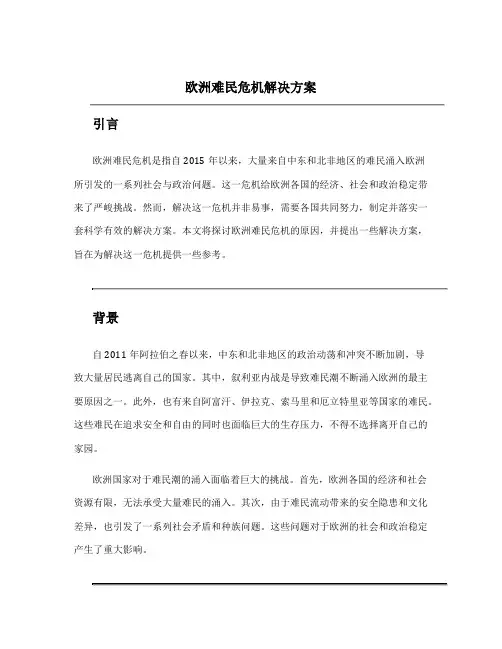
欧洲难民危机解决方案引言欧洲难民危机是指自2015年以来,大量来自中东和北非地区的难民涌入欧洲所引发的一系列社会与政治问题。
这一危机给欧洲各国的经济、社会和政治稳定带来了严峻挑战。
然而,解决这一危机并非易事,需要各国共同努力,制定并落实一套科学有效的解决方案。
本文将探讨欧洲难民危机的原因,并提出一些解决方案,旨在为解决这一危机提供一些参考。
背景自2011年阿拉伯之春以来,中东和北非地区的政治动荡和冲突不断加剧,导致大量居民逃离自己的国家。
其中,叙利亚内战是导致难民潮不断涌入欧洲的最主要原因之一。
此外,也有来自阿富汗、伊拉克、索马里和厄立特里亚等国家的难民。
这些难民在追求安全和自由的同时也面临巨大的生存压力,不得不选择离开自己的家园。
欧洲国家对于难民潮的涌入面临着巨大的挑战。
首先,欧洲各国的经济和社会资源有限,无法承受大量难民的涌入。
其次,由于难民流动带来的安全隐患和文化差异,也引发了一系列社会矛盾和种族问题。
这些问题对于欧洲的社会和政治稳定产生了重大影响。
欧洲难民危机解决方案1. 国际合作和共享责任解决欧洲难民危机的首要问题是各国间的合作和责任共担。
国际社会应加强合作,共同应对这一全球性挑战。
各国应主动参与难民救援和安置工作,积极提供援助和资源支持,共同承担大规模难民流入所带来的压力。
2. 建立集中式难民安置机构欧洲国家应建立集中式的难民安置机构,提供临时住所、食品、医疗和教育等基本服务,帮助难民顺利融入社会。
这些集中式机构可以更好地管理难民流动,减少难民在社会中的流浪和滞留问题。
3. 加强边境管理和安全防护为了应对难民潮,欧洲各国应加强边境管理和安全防护。
可以采取增加边境巡逻人员、加强边境检查和控制措施等手段,有效防止非法难民的涌入和安全隐患的产生。
此外,通过加强与中东和北非国家的合作,共同打击人口走私和非法入境活动,从根本上减少难民潮的产生。
4. 促进难民社会融入欧洲国家应加大对难民的社会融入力度,提供基本的法律保护、语言培训和职业技能培训等支持。


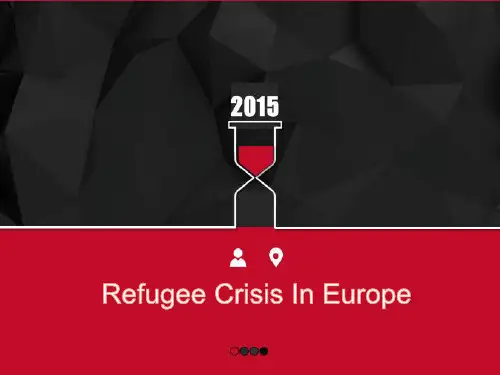
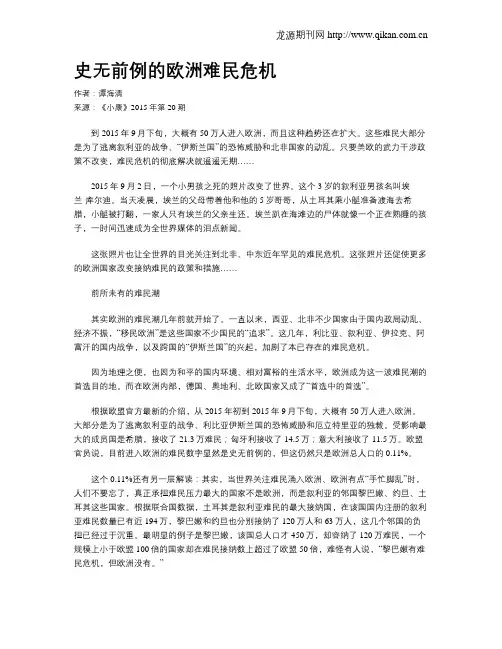
史无前例的欧洲难民危机作者:谭海清来源:《小康》2015年第20期到2015年9月下旬,大概有50万人进入欧洲,而且这种趋势还在扩大。
这些难民大部分是为了逃离叙利亚的战争、“伊斯兰国”的恐怖威胁和北非国家的动乱。
只要美欧的武力干涉政策不改变,难民危机的彻底解决就遥遥无期……2015年9月2日,一个小男孩之死的照片改变了世界。
这个3岁的叙利亚男孩名叫埃兰·库尔迪。
当天凌晨,埃兰的父母带着他和他的5岁哥哥,从土耳其乘小艇准备渡海去希腊,小艇被打翻,一家人只有埃兰的父亲生还。
埃兰趴在海滩边的尸体就像一个正在熟睡的孩子,一时间迅速成为全世界媒体的泪点新闻。
这张照片也让全世界的目光关注到北非、中东近年罕见的难民危机。
这张照片还促使更多的欧洲国家改变接纳难民的政策和措施……前所未有的难民潮其实欧洲的难民潮几年前就开始了。
一直以来,西亚、北非不少国家由于国内政局动乱、经济不振,“移民欧洲”是这些国家不少国民的“追求”。
这几年,利比亚、叙利亚、伊拉克、阿富汗的国内战争,以及跨国的“伊斯兰国”的兴起,加剧了本已存在的难民危机。
因为地理之便,也因为和平的国内环境、相对富裕的生活水平,欧洲成为这一波难民潮的首选目的地。
而在欧洲内部,德国、奥地利、北欧国家又成了“首选中的首选”。
根据欧盟官方最新的介绍,从2015年初到2015年9月下旬,大概有50万人进入欧洲。
大部分是为了逃离叙利亚的战争、利比亚伊斯兰国的恐怖威胁和厄立特里亚的独裁。
受影响最大的成员国是希腊,接收了21.3万难民;匈牙利接收了14.5万;意大利接收了11.5万。
欧盟官员说,目前进入欧洲的难民数字显然是史无前例的,但这仍然只是欧洲总人口的0.11%。
这个0.11%还有另一层解读:其实,当世界关注难民涌入欧洲、欧洲有点“手忙脚乱”时,人们不要忘了,真正承担难民压力最大的国家不是欧洲,而是叙利亚的邻国黎巴嫩、约旦、土耳其这些国家。
根据联合国数据,土耳其是叙利亚难民的最大接纳国,在该国国内注册的叙利亚难民数量已有近194万,黎巴嫩和约旦也分别接纳了120万人和63万人,这几个邻国的负担已经过于沉重。
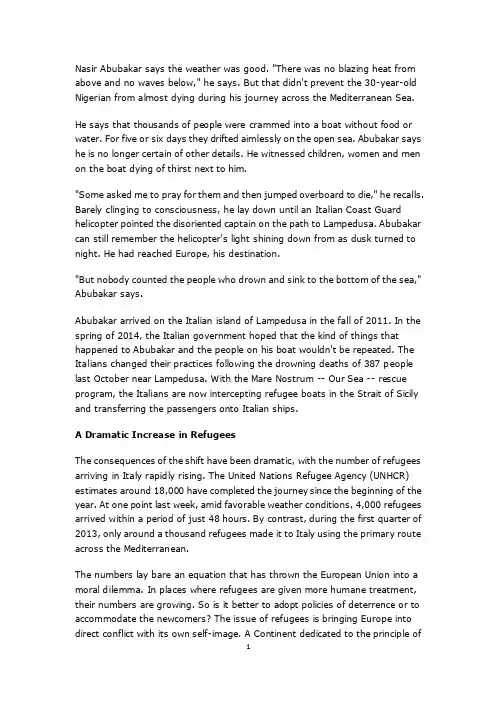
Nasir Abubakar says the weather was good. "There was no blazing heat from above and no waves below," he says. But that didn't prevent the 30-year-old Nigerian from almost dying during his journey across the Mediterranean Sea.He says that thousands of people were crammed into a boat without food or water. For five or six days they drifted aimlessly on the open sea. Abubakar says he is no longer certain of other details. He witnessed children, women and men on the boat dying of thirst next to him."Some asked me to pray for them and then jumped overboard to die," he recalls. Barely clinging to consciousness, he lay down until an Italian Coast Guard helicopter pointed the disoriented captain on the path to Lampedusa. Abubakar can still remember the helicopter's light shining down from as dusk turned to night. He had reached Europe, his destination."But nobody counted the people who drown and sink to the bottom of the sea," Abubakar says.Abubakar arrived on the Italian island of Lampedusa in the fall of 2011. In the spring of 2014, the Italian government hoped that the kind of things that happened to Abubakar and the people on his boat wouldn't be repeated. The Italians changed their practices following the drowning deaths of 387 people last October near Lampedusa. With the Mare Nostrum -- Our Sea -- rescue program, the Italians are now intercepting refugee boats in the Strait of Sicily and transferring the passengers onto Italian ships.A Dramatic Increase in RefugeesThe consequences of the shift have been dramatic, with the number of refugees arriving in Italy rapidly rising. The United Nations Refugee Agency (UNHCR) estimates around 18,000 have completed the journey since the beginning of the year. At one point last week, amid favorable weather conditions, 4,000 refugees arrived within a period of just 48 hours. By contrast, during the first quarter of 2013, only around a thousand refugees made it to Italy using the primary route across the Mediterranean.The numbers lay bare an equation that has thrown the European Union into a moral dilemma. In places where refugees are given more humane treatment, their numbers are growing. So is it better to adopt policies of deterrence or to accommodate the newcomers? The issue of refugees is bringing Europe into direct conflict with its own self-image. A Continent dedicated to the principle ofhuman rights and is fond of pointing out its own Christian roots to other cultures is still lagging behind its own aspirations.Meanwhile, the scope of Europe's unresolved refugee problem has taken on a new dynamic with the explosive growth of refugees coming to Italy. The government in Rome has already rung the alarm bells, with Interior Minister Angelino Alfano warning that 300,000, or perhaps even 600,000, people in Libya alone were ready to board smuggling boats bound for Europe. "We can't take them all," he said.'This Is Not an Italian Problem'Italy has long been calling for changes to be made to the EU's 2003 Dublin regulation, which stipulates that asylum applications can only be processed in the country where refugees first set foot on EU soil. "This is not an Italian problem," Foreign Minister Federica Mogherini said. "Refugees are in the EU as soon as they arrive in Italy."In light of the fact that the Dublin regulation has essentially failed, politicians in Germany are viewing the rising numbers of refugees with increased concern. A spokesman for the German Interior Ministry warns that officials in Berlin assume that "a number of boat refugees will continue their journeys to Germany to apply for asylum here." The numbers seem to support that claim. During the first quarter of 2014, the number of asylum seekers in Germany rose by 76 percent against the same time period last year. Increased attention is being paid to the issue in German states as well, which, together with local communities, are responsible for providing accommodations for refugees. In Lower Saxony, Interior Minister Boris Pistorius, of the center-left Social Democratic Party (SPD), has asked his staff to provide him with regular updates on the situation in the Mediterranean. "We're going to have difficulties providing accommodations," he warns.Still, Berlin officials haven't exactly been sympathetic to calls for help from Italy. Officials in the Interior Ministry don't see any reason for special program to take in additional refugees in response to the situation in Italy. The spokesman notes that Germany itself is currently taking in far more asylum seekers than Italy. Last year, Germany registered 127,000 new asylum seekers, compared to only 27,000 in Italy.Martin Schulz, the Social Democrats' leading candidate for elections to the European Parliament, has a different take. He argues that the affected countries have been left in the lurch by the EU for some time now. "In areas facing particular hardship as a result of immigration, the distribution of refugees amongst the entire EU needs to be organized more equitably," he argues. "Financial assistance should also be supplied to those who are doing more than others." The leading candidate for the conservative Christian Democrats, Jean-Claude Juncker, is also calling for "greater solidarity in receiving refugees." He says that reaching agreement on implementing a quota system -- a controversial method that would require EU countries not bordering on the Mediterranean to take in a set number of additional refugees to help alleviate the burden -- should be added to the agenda of the next EU summit.One of Europe's Most Divisive IssuesThe unresolved refugee problem has returned to the fore in Europe just as it prepares for May's European Parliament elections. Once again, the EU is showing itself to be a union of national interests -- and refugees have long been among the most contentious issues in the 28-member bloc. And Germany hasn't distinguished itself either. After the drama off Lampedusa last fall,then-Interior Minister Hans-Peter Friedrich of the conservative Christian Social Union, the Bavarian sister party to Merkel's Christian Democratic Union (CDU), hastily ensured Germans that the EU's asylum policies wouldn't be changed in any way.Remarks like that set the tone in Europe and EU leaders subsequently delayed taking any steps toward fundamental reform. When Schulz, currently pres ident of the European Parliament, called on other member states to be more generous than Italy in taking in refugees, he faced a barrage of criticism back home in Germany. In times of widespread euro-skepticism and double-digit unemployment among young adults in euro crisis countries, the line went, proposals like that don't fly with the public. They merely put wind in the sails of radical opponents of Europe.And that goes to the heart of the dilemma currently facing Europe's mainstream political parties. They have every reason to fear that a broad debate over the EU's failed refugee policies could become a draw for right-wing populists. Addressing the problem, Juncker said recently: "We have to fight to prevent gains by the right-wing radicals in the European election."'Being on Some Overloaded Boat Is Not an Admission Ticket'In Germany, Bernd Lucke, spokesman for the nascent euro-critical party Alternative for Germany (AFD), is calling for refugees who enter the country illegally be taken immediately to a "safe African country." "We have to make it clear that being on some overloaded boat is not an admission ticket to the EU. Otherwise, more and more people will undertake this risky trip," he says.Andreas Scheuer, general secretary of the CSU, leaves no doubt that his party plans to position itself clearly within the anti-immigration camp during the election. "Asylum policies and the issue of poverty migration will play an important role in the campaign for the European Parliament, he says. "We have learned from experience that it is asylum in Germany that is sought by those who land in Italy." Noting that the number of people applying for asylum in Germany is already higher than it has been in years, he adds: "We cannot carry the weight of the entire world's pain."With lines like, "those who deceive are out," tough talk on refugees and related policies has become part of the CSU's standard repertoire. Whereas Chancellor Merkel's CDU is taking a more distanced approach to the challenge presented by the anti-euro AfD, its Bavarian counterpart is engaging in direct confrontation -- its callous reaction to the sufferings of refugees in Italy reflects that.Things could have turned out differently. The tragedy in Lampedusa could easily have served to trigger a deep and critical look at European refugee policy. Instead EU leaders limited any new measures to those focused on preventing such jarring catastrophes from happening again.Eurosur is the abbreviation given to the European Border Surveillance System, a sophisticated monitoring system consisting of satellites, drones and radar systems. The program, developed at a cost of around €340 million ($470 million), has been in operation in several EU member states since December. But it is extremely controversial because it has many applications: It can be used to save refugees, intercept them or even keep them out.But Eurosur is not a solution for the refugee issue. Indeed, the situation continues to escalate, with the number of illegal border crossings into the EU now even larger than it was at the peak of the Arab Spring in 2011. Seventy percent of the refugees coming across the Mediterranean originate in Libya, which has become a failed state following the toppling of dictator MoammarGadhafi. Italian Foreign Minister Mogherini has noted that the situation in Libya makes addressing the refugee problem all the more difficult given that talks with the government there are a virtual impossibility.Is the Boat Full?The number of asylum seekers in Germany has likewise risen continuously in recent years. Indeed, astonishingly few apply for asylum at the EU's external borders in Italy, Spain or Poland. Relative to its number of inhabitants, Italy is only in 15th place; Germany is in seventh. Relative to their populations, smaller member states like Malta or Sweden take in three times as many refugees as Germany does and the total percentage of all refugees in Germany remains at a figure far below 1 percent of the entire population.So is the boat full, as the old populist rhetoric goes? It's a controversial issue, especially if you ask the German people directly. A survey conducted by pollster Forsa in March found that only one in three Germans wants Germany to take in more refugees. Hamburg Mayor Olaf Scholz of the SPD, who is closely involved in the issue of migration in a city with a high population of immigrants, nevertheless pleads for a more liberal visa policy. He says that preparedness to take in refugees and tolerance is still substantial but asks, "What happens if the people say: That's enough?"German Development Minister Gerd Müller of the CSU suggests one cannot forget the old idea of addressing the refugee problem at its source: Africa. He recently ordered his staff at the ministry to come up with a special program for refugees. But the main driving force behind his dedication to the issue is that of preventing a further exodus to Europe. A 100-day progress report from the ministry makes clear its desire to "vanquish the causes of flight."When it comes to Africa, though, things have been heading in the opposite direction. While Germany slightly increased its development ex penditures last year, funds for Africa have decreased at a rapid pace. According to calculations by the non-government organization ONE, which focuses on reducing poverty around the world, Germany cut its development spending in Africa by half a billion euros in 2013. The organization claims that no other donor country has scaled back its participation to the degree Germany has. At best, the €100 million that Berlin has since been pledged to Africa can be viewed as a damage control effort.BY NICOLA ABÉ, CHRISTIANE HOFFMANN, HORAND KNAUP, KAROLINA KUHLA, WALTER MAYR, PETER MÜLLER, GORDON REPINSKI AND GREGOR PETER SCHMITZTranslated from the German by Daryl Lindsey欧洲难民危机:西方难逃历史责任我要评论2015年09月07日18:44:00 来源:新华网我有话要说(2人参与) 新华网北京9月7日电(记者纪时平)连日来,年仅3岁的叙利亚难民小艾兰“沉睡”海滩的悲惨场面震惊世界,一些欧洲国家动了恻隐之心,拥堵在匈牙利的数千难民近日终于如愿以偿前往奥地利、德国等国,还有一些欧洲国家也有所松口。
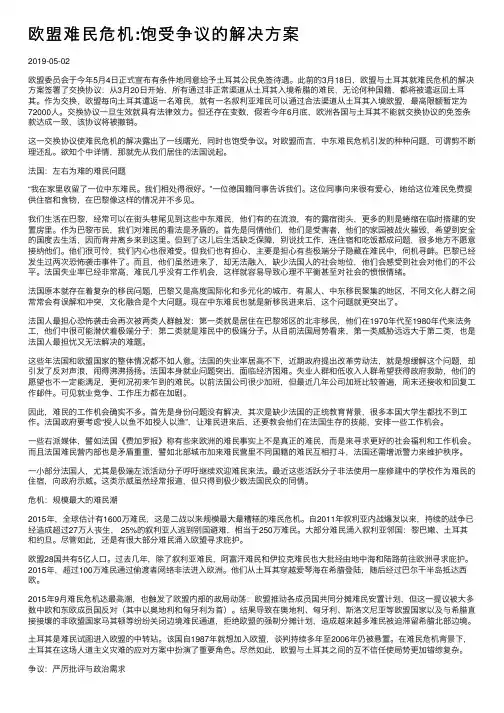
欧盟难民危机:饱受争议的解决⽅案2019-05-02欧盟委员会于今年5⽉4⽇正式宣布有条件地同意给予⼟⽿其公民免签待遇。
此前的3⽉18⽇,欧盟与⼟⽿其就难民危机的解决⽅案签署了交换协议:从3⽉20⽇开始,所有通过⾮正常渠道从⼟⽿其⼊境希腊的难民,⽆论何种国籍,都将被遣返回⼟⽿其。
作为交换,欧盟每向⼟⽿其遣返⼀名难民,就有⼀名叙利亚难民可以通过合法渠道从⼟⽿其⼊境欧盟,最⾼限额暂定为72000⼈。
交换协议⼀旦⽣效就具有法律效⼒。
但还存在变数,假若今年6⽉底,欧洲各国与⼟⽿其不能就交换协议的免签条款达成⼀致,该协议将被撤销。
这⼀交换协议使难民危机的解决露出了⼀线曙光,同时也饱受争议。
对欧盟⽽⾔,中东难民危机引发的种种问题,可谓剪不断理还乱。
欲知个中详情,那就先从我们居住的法国说起。
法国:左右为难的难民问题“我在家⾥收留了⼀位中东难民。
我们相处得很好。
”⼀位德国籍同事告诉我们。
这位同事向来很有爱⼼,她给这位难民免费提供住宿和⾷物,在巴黎像这样的情况并不多见。
我们⽣活在巴黎,经常可以在街头巷尾见到这些中东难民,他们有的在流浪,有的露宿街头,更多的则是蜷缩在临时搭建的安置房⾥。
作为巴黎市民,我们对难民的看法是⽭盾的。
⾸先是同情他们,他们是受害者,他们的家园被战⽕摧毁,希望到安全的国度去⽣活,因⽽背井离乡来到这⾥。
但到了这⼉后⽣活缺乏保障,别说找⼯作,连住宿和吃饭都成问题,很多地⽅不愿意接纳他们。
他们很可怜,我们内⼼也很难受。
但我们也有担⼼,主要是担⼼有些极端分⼦隐藏在难民中,伺机寻衅。
巴黎已经发⽣过两次恐怖袭击事件了。
⽽且,他们虽然进来了,却⽆法融⼊,缺少法国⼈的社会地位,他们会感受到社会对他们的不公平。
法国失业率已经⾮常⾼,难民⼏乎没有⼯作机会,这样就容易导致⼼理不平衡甚⾄对社会的愤恨情绪。
法国原本就存在着复杂的移民问题,巴黎⼜是⾼度国际化和多元化的城市,有⿊⼈、中东移民聚集的地区,不同⽂化⼈群之间常常会有误解和冲突,⽂化融合是个⼤问题。
视界观 OBSERVATION SCOPE VIEW282欧洲难民危机的现状、成因及特点张蕾(青岛大学,山东,青岛 266100)一、欧洲难民危机的现状根据联合国难民署2018年6月发布的统计数据,截至2017年底,全球被迫流离失所者人数达6850万,被迫出逃他国的难民人数为290万,同比去年增长290万人,为难民署有记录以来最大增长幅度。
①大量难民的涌入冲击了欧洲一体化的深入发展,文明的差异更是凸显了欧洲国家深藏的社会问题,饱受困扰的难民问题最终演变成为难民危机。
最新统计数据显示,截至2019年9月初,从海上进入欧洲的非法移民和难民已达55918人,其中希腊和西班牙分别接收了30755人、15798人,创下2015年欧洲难民危机以来的新高。
近来,伊德利卜地区武装冲突不断升级,导致更多叙平民流离失所。
据联合国统计,叙利亚新增难民数高达90万人,恐将引发新一轮难民危机。
二、欧洲难民危机的成因首先,叙利亚内战延续多年,伤亡惨重,是造成欧洲难民危机的直接因素。
“叙利亚政策研究中心2016年2月的2月的一份报告估计,截至2015年底,叙利亚冲突中直接死于暴力的人数高达40万,另有7万平民因缺乏基本的生活物资和医疗服务而死亡,也迫使大量平民逃离家园,由此产生了311万难民,117万移民,另有7万平民因缺乏基本的生活物资和医疗服务而死亡,受伤人数高达190万,合计伤亡人数高达230万。
如此严重的伤亡迫使大量平民逃离家园,由此产生311万难民②。
”持续多年的叙利亚内战是造成难民危机的根源。
其次,“伊斯兰国”恐怖主义势力在此地的长期盘踞是此次难民危机的重要推手。
叙利亚教派林立,宗教矛盾突出。
主要由逊尼派武装人员组成的“伊拉克伊斯兰国”打着“叙利亚圣战”的旗号号召逊尼派穆斯林积极加入,这一举动迅速得到了逊尼派武装人员的积极响应。
部分海湾国家诸如沙特阿拉伯,巴林,卡塔尔等逊尼派国家更是给与武器与物质援助。
伊斯兰国的势力范围不断扩大,充分利用西方诸国联合反政府武装打击政府军的契机,大举攻城略地,使得内战一直延续,产生大量难民。
欧洲难民危机的解决与影响随着世界经济一体化和全球化的发展,人口流动成为一个全球性的问题,难民问题也愈发突出。
近年来,欧洲难民危机引起了广泛的关注和讨论。
本文将对欧洲难民危机的解决以及其带来的影响进行探讨。
一、欧洲难民危机的解决1.政府合作与协商欧洲各国政府应加强沟通合作,共同制定解决难民危机的政策和措施。
建立难民危机应急机制,加强信息共享和资源调配,形成合力。
同时,在国际层面加强与其他发达国家和欧盟外部伙伴的协商与合作,共同分担难民负担,遏制难民潮的蔓延。
2.加强边境控制与安全防护各国政府应加强对边境的控制和管理,采取必要的安全防护措施,确保国境的安全与稳定。
完善边境检查机制,加大边境警力投入,加强对偷渡集团和非法渠道的打击,防止难民大规模非法入境。
3.人道主义援助与难民保护在解决难民问题时,应以人道主义为出发点,为难民提供基本的生活保障和人道援助。
建立起一套完善的难民保护机制,提供庇护、教育、医疗等基本服务,帮助难民融入当地社会,重建新的生活。
4.促进经济发展与创造就业机会欧洲各国应通过激励经济发展,创造更多的就业机会,为难民提供更好的工作条件和社会保障。
通过促进产业升级和技术创新,吸引外来投资,提高经济竞争力,为难民提供更多融入社会的机会。
二、欧洲难民危机的影响1.社会经济影响难民危机对欧洲国家的社会经济发展带来了一定的压力。
大量涌入的难民需要住房、医疗、教育等基本服务设施,这对当地的社会福利系统和公共资源构成了挑战。
同时,难民对劳动力市场的冲击也不能忽视。
虽然一些难民具备一定的技能和劳动力,但也有一部分难民需要接受教育和培训才能适应当地就业市场,这对当地经济造成了一定的压力。
2.文化多样性和社会融合大规模难民涌入对欧洲国家的文化多样性和社会融合提出了新的挑战。
难民来自不同的国家和不同的文化背景,他们的宗教信仰、价值观念等与当地居民或存在差异,需要双方进行相互理解和尊重。
同时,也需要通过教育和培训等手段,帮助难民更好地融入当地社会,促进社会融合与和谐发展。
第1篇一、引言近年来,随着全球难民问题的日益严重,欧盟国家面临着前所未有的挑战。
如何有效应对难民潮,成为欧盟峰会的重要议题。
本文将从欧盟峰会难民解决方案的背景、现状、对策以及未来展望等方面进行深入探讨。
二、欧盟峰会难民解决方案的背景1. 欧洲难民危机自2015年以来,欧洲难民危机愈演愈烈。
大量难民涌入欧洲,给各国政府和社会带来了巨大压力。
据统计,2015年,超过100万难民涌入欧洲,其中多数来自叙利亚、阿富汗和伊拉克。
2. 欧盟内部分歧面对难民危机,欧盟内部各国意见不一,分歧严重。
一方面,一些国家如德国、瑞典等主张开放边境,接纳更多难民;另一方面,一些国家如意大利、希腊等则认为难民问题应由各国分担,主张限制难民入境。
3. 欧盟峰会召开为解决难民危机,欧盟峰会多次召开,旨在寻求各方共识,制定难民解决方案。
三、欧盟峰会难民解决方案的现状1. 分担机制在欧盟峰会上,成员国就难民分担机制达成一致。
2015年,欧盟通过“一揽子方案”,规定各国根据自身经济实力和人口比例分担难民责任。
然而,这一机制在实际执行过程中,仍存在争议和分歧。
2. 限制难民入境为缓解难民压力,欧盟峰会提出限制难民入境措施。
例如,加强边界管控,建立难民识别和筛选机制,以及与土耳其等第三国签署协议,共同应对难民问题。
3. 求助第三方国家欧盟峰会鼓励成员国与第三方国家合作,共同应对难民危机。
例如,与土耳其、利比亚等地区国家签署协议,提供经济援助和培训,以减少难民流入。
四、欧盟峰会难民解决方案的对策1. 完善分担机制为解决分担机制问题,欧盟峰会应从以下几个方面着手:(1)建立公平、透明的分配标准,确保各国在难民分担中公平受益;(2)加大对经济困难国家的支持力度,提高其应对难民危机的能力;(3)加强成员国间的沟通与合作,共同应对难民危机。
2. 加强边界管控为有效遏制难民入境,欧盟峰会应采取以下措施:(1)加强边界警力,提高边境管控能力;(2)建立统一的难民识别和筛选机制,确保难民身份的真实性;(3)加强与第三国的合作,共同应对难民问题。
0322015年9月,针对欧盟内部在接受黎巴嫩难民时产生的争执与推诿,欧盟委员会主席让-克洛德·容克在欧洲议会发表演说,试图唤起欧洲对于自身这块长期充满着战争、迁移与融合的土地上,关于难民的历史记忆:“我们欧洲人必须记得,欧洲大陆上的所有人在某个时刻都曾是难民;我们欧洲人不该忘记,寻求庇护的权利是最根本也最重要的人权,我们永不应忘记此点。
”对不幸者的人道主义是我们理解此一轮欧洲难民危机的起点,它是战后欧洲精神中最伟大的政治原则之一,是一个自由、和平、繁荣的欧洲所能给出的象征与许诺。
然而11月13日巴黎城区恐怖主义袭击的枪声,打破了这一许诺,并用鲜血指向其最无力和虚伪之处:这次Copyright©博看网 . All Rights Reserved.033袭击对于欧洲的意义并不亚于9·11之于美国,且其更为令人恐惧之处在于,它是一场来自内部的战争。
同为欧洲公民的法国第二代移民,在他们共同居住的城市里,以最原始野蛮的方式处决自己的法国“同胞”。
而从境外潜入的凶手则利用了此轮难民潮来掩盖自己的身份。
前者意味着此前进入欧洲的移民与难民并未有机融入这个社会,而后者则将原本在难民潮中举棋不定的欧洲拖入更为胶着的阴翳中。
欧洲长久以来围绕着难民生发的诸多争议与担忧,以极端主义的方式在巴黎事件中实现了它最为悲剧性的一面。
正如王宇洁文章所指出的,作为两个地缘上极为接近的文化传统,伊斯兰与欧洲世界长达数千年的征服与被征服史,在伊斯兰世界陷入动荡而欧洲持续繁荣的今日,最终胜利者却未必是欧洲。
欧洲内部的右翼民族主义者相信,由于敞开怀抱接纳了太多与其文化传统全然无法兼容的穆斯林,最终欧洲将被高生育率的穆斯林“反征服”。
尽管舆论长期谴责这种保守主义思路,它长久以来也未真正影响欧洲的开放政策。
然而这无法掩盖保守主义乃至纳粹式的种族主义在缺乏安全感的民众之中的潜滋暗长,陈宇文章就指出了在难民潮爆发后,原本坚持人道主义理想的欧洲民众,在抢占就业、犯罪率上升以及触犯欧洲价值观这些实际问题面前,所发生的民意态度上的转变。
二、难民和非法移民从地理学角度讲,难民是人口迁移的特殊形式。
因天灾、战祸、阶级压迫和民族压迫、宗教和种族歧视、国界变更等,导致大批人口被迫离开家园,流落他乡,形成强制性的迁移。
难民是国际社会的一个特殊群体,是战争、种族迫害、部族矛盾、国家领土变动、政治避难、自然灾害、经济恶化等原因造成的一个不能或不愿回原籍国的群体,具有群体性、无助性、流动性、自发性和被动性的特征。
难民分为经济难民、战争难民、种族与宗教难民、政治难民、自然灾害难民等。
根据国际人道法,应保护人们免于流离失所;在流离失所期间,只要其未直接参与敌对行动,就应作为平民受到保护。
国际人道法还保障救援和人道组织能够接触武装冲突局势中的难民和国内流离失所者。
冲突各方必须为药品、食物、毯子和帐篷等救援物资的供应提供便利。
遗憾的是在最近的许多冲突中,这些规则都受到了忽视,这使难民和国内流离失所者身陷险境。
红十字国际委员会不断呼吁各国和非国家武装团体在应对平民时,遵守并确保遵守国际法和基本人道原则。
只有通过遵守这些武装冲突规则,才能预防难民潮和国内迁移;同样,只有当国际人道法得到遵守时,被迫逃离家园的人才能得到保护。
又称偷渡客,是指非本国公民透过非法的方式跨越边境的“移民”。
这个名词通常暗示著许多社会问题。
如经济、社会福利、教育、犯罪、公共福利、健康保险、人权等。
对于本国人来说,非法移民常被认为是对传统文化的威胁,因为他们占用公共设施、大幅增加政府支出却没缴税或是只有少部分人缴税、以及成为廉价劳动力冲击本地人就业等。
对于本国人来说,相对于自己缴的税,随着非法移民人数增加,自己能得到的社会福利被稀释而递减。
不过令人惊讶的是,在美国,非法移民的犯罪率远低于本国人的犯罪率。
根据时代周刊,2008年加州本地人的犯罪率是非法移民的10倍。
二、以前的欧洲难民定和实施引进外国劳工的移民政策。
而这些来自原社会主义国家的申请难民身份的非法移民,多是年轻力壮的青年人。